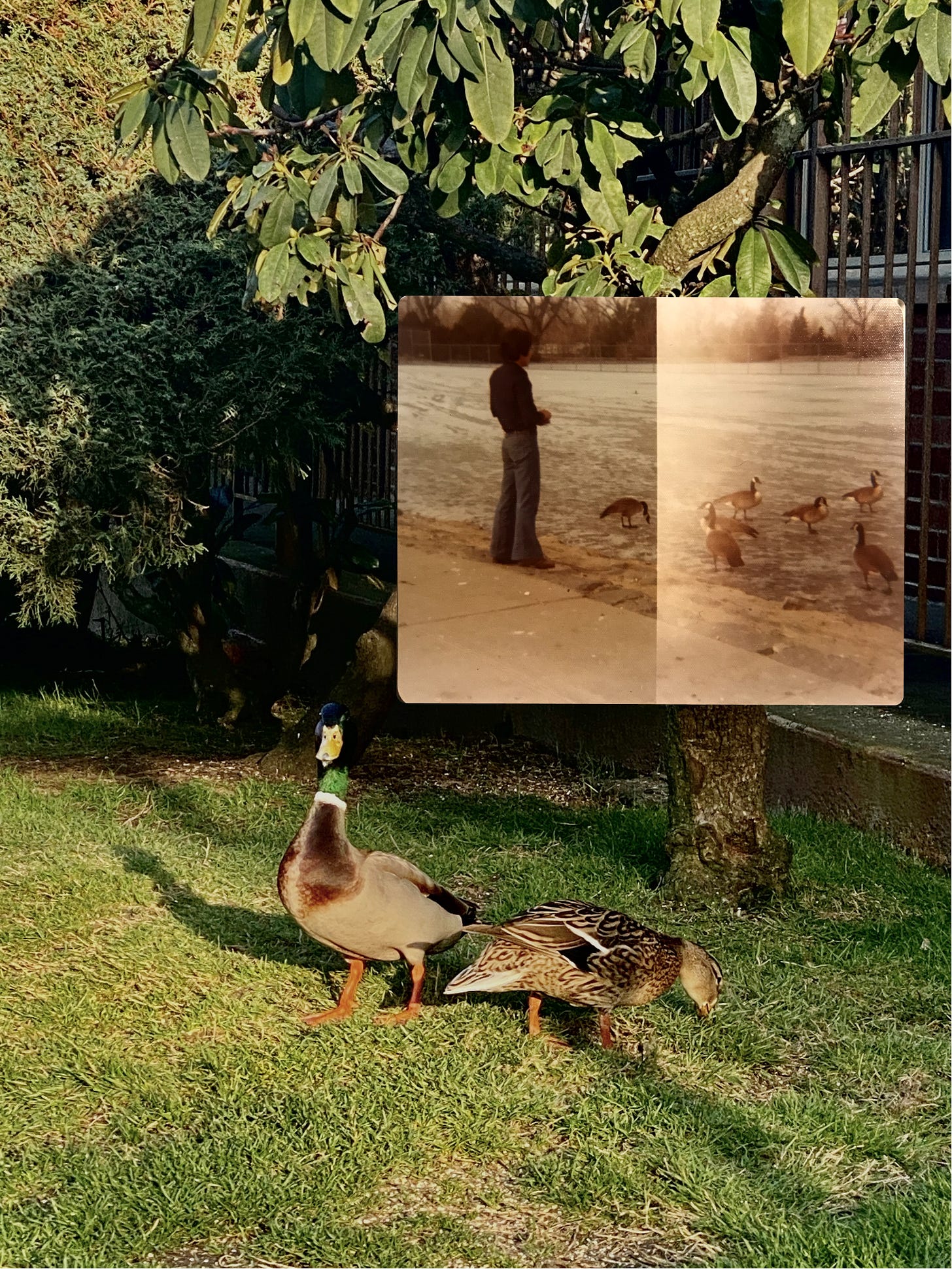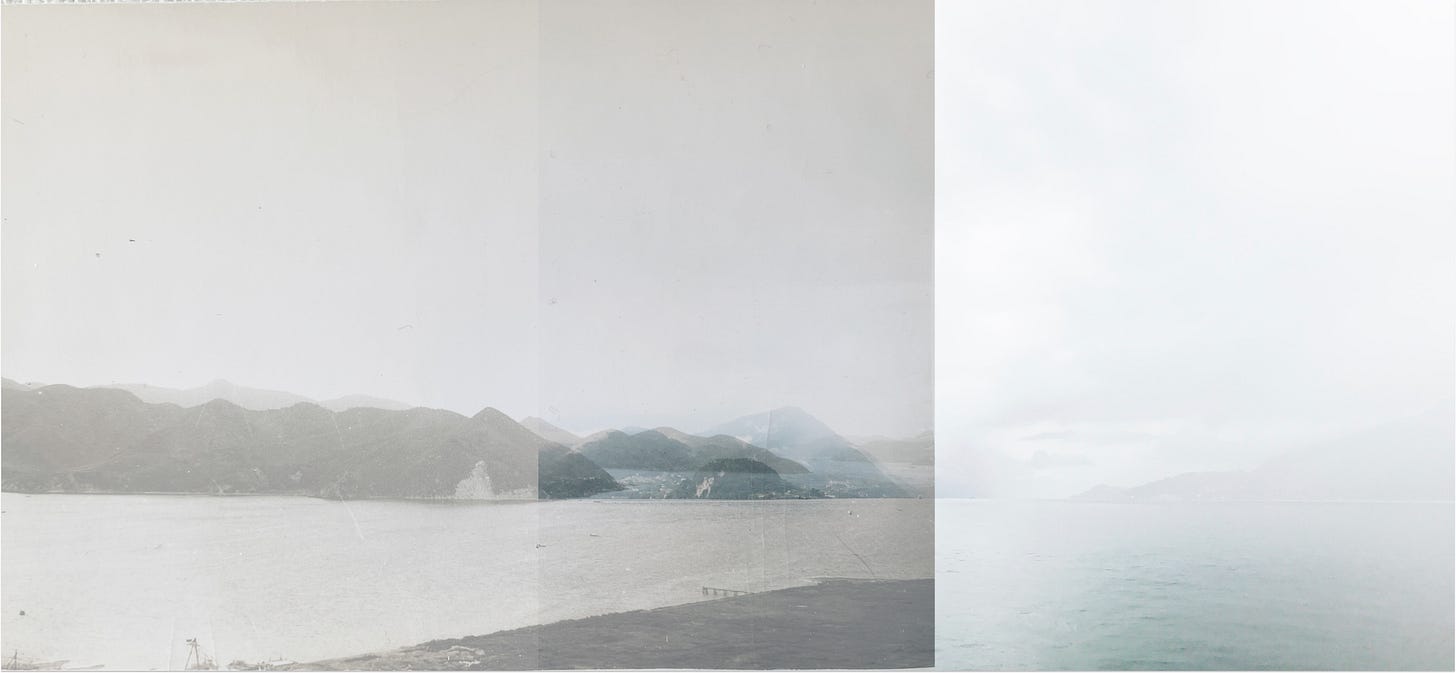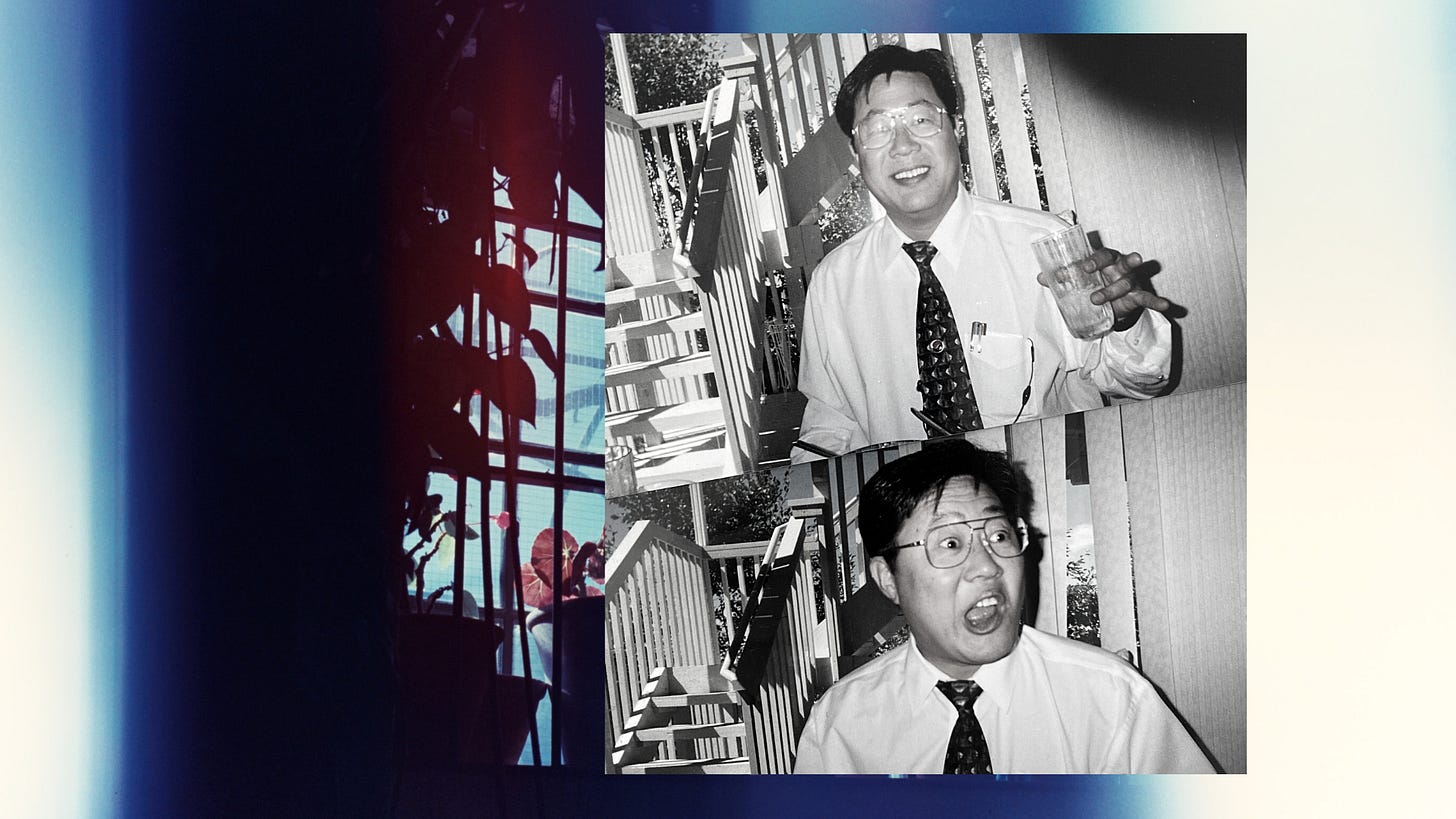GRIEVER's DOSSIER // "grief, like a lot of hard feelings, was something I carried with me but always outside of me"
ft. Mona Y. Lee
GRIEVER’S DOSSIER is a Q+A series that invites grieving humans to share their experiences with death, loss, life, legacy, mourning, memorials, and more. This is the eighth such dossier in the series; you can read the first one here, which I (Laura) answered myself. If you’d like to keep going; Christine’s is here, Hans’s is here, Autumn’s is here, John’s is here, Mirielle’s is here, and Liz’s is here. Today, you’ll meet Mona.
Friendship isn’t a thing I necessarily want to leave to chance, but in one scenario at least, chance served me very well. More specifically: Chance in the form of a seating assignment. Upon starting a new position at a national fashion brand based here in Seattle, I was given a desk between a window and an incredibly kind and wise writer/editor human named Mona Lee. For reasons I’m still trying to unwind, that job felt like shoes too tight to wear on most days—except for the fact of Mona. In her quiet but ready way, she was there to tell me how to find a file or to let me talk through a weird stuck point, and always in an outfit. I’m a person who will forever be buoyed by excellent self-expression and Mona, a chic sport-goth in and of the moody Northwest gave such good visual floatation support. But of course, there is so very much more to Mona than her impact on me. She’s both literally and visually a very gifted storyteller; in her poetry, her photography, and her written and oral accounts of what’s what, her heart catches the realest, rawest, rarest truths, and holds them up to the milky clear light, letting the sun flare out and blur the edges just so. If that sounds good, I’d recommend following her on IG.
Speaking of images: In addition to the customary1 GRIEVER’s BALL photo treatments, you’re blessed here with several composite images that Mona created by pairing her family’s archival photographs with more contemporary shots from her own collection. Catch the captions and end note for more.
WHO ARE YOU GRIEVING?
My dad, Hyung Max Lee aka Hyung Suk Lee aka Hyung Mo Lee (he thought “Mo” sounded too country and changed it to the slicker “Suk” at some point). Max was born in Korea, just as the peninsula was being torn apart and suspended in an endless proxy war, an endless state of grief, an endless state of han.
He was murdered on January 18, 2003 in Kent, WA by a client. Events leading up to his death, much like the death itself, were what some might call unseemly. He left behind a widow, ex-wife, mother, four kids, two brothers, and lots of messy—some forever-unknowable—secrets.
Differently but similarly, I’m background-grieving my friend Liz, who died on yet another January 18 (last year); my partner’s grandma Mags, who died last summer; and my chin halmoni (paternal grandmother), my favorite grandma, who died on the National Day of Mourning of 2019.
But mostly my dad.
WHAT’S YOUR FAVORITE THING ABOUT YOUR DAD’S LIFE?
That he left everything he knew to build a life he believed would be better.
WHAT IS YOUR CURRENT STATE OF MIND IN TERMS OF YOUR GRIEF?
For a long time, grief, like a lot of hard feelings, was something I carried with me but always outside of me. My dad’s death, in particular, was given a wide berth. Our relationship had been complicated and difficult, and the honest truth is that the love I had for him was almost always dampened by intense fear and resentment.
I busied myself with the task of surviving until coping mechanisms became more problematic than helpful, and life kind of forced my hand. My unofficial process of learning how to become a person / reparent myself / heal shit started about a decade ago. In the beginning, I kept feeling like there was a backlog of unprocessed trauma I needed to work through first—everything before the murder—as though I had to tend to the grief shrouds in order of appearance. A part of me wanted to provide order to what I would come to understand as unorderable.
These days, I’m working on letting grief—all of it, any of it—take its rightful place inside of me. Sometimes, it feels harder than ever because I’ve always relied on dissociation to keep me safe. But I’ve metabolized / exorcized more through this useful / useless lil’ body in the last few years than in all the time that came before. It’s been a hard and heartening process.
DOES DEATH HAVE A GIFT? DOES GRIEF? WHEN THINKING ABOUT YOUR DAD’S DEATH AND THE EXPERIENCE OF YOUR GRIEF, WHAT DO YOU KNOW, SEE, FEEL, OR EXPERIENCE NOW THAT YOU DIDN’T OR COULDN’T BEFORE?
Yes and yes. I probably wouldn’t lead with that if I were comforting someone in grief, but yeah. In some ways, we live because we die and we die because we live. Less opposites, more parts of the same thing.
Maybe one of death’s gifts is grief itself. Maybe grief shows me that I had something to lose, and that loss could be additive vs. emptying, another experience that fleshes me out, reminds me that we all need each other a lot more than we think. Maybe.
I want to believe that life is supposed to add to who we are, not flay us away or ruin us in a neverending aftermath of hard experiences. I want to believe that we know, in our bones, how to come out the other sides of things; changed, for sure, but not always worse for it.
WHAT DO YOU THINK YOUR DAD WOULD HAVE SAID WAS HIS LEGACY? WHAT WOULD HE HAVE SAID ABOUT LEGACY IN GENERAL, AND THE NOTION OF THINKING ABOUT ONE’S LIFE IN THAT WAY?
He’d have probably said that my siblings and I are his legacy, that we are an extension of him (filial piety / collectivism and all that). But I’m not sure he ever really paused to consider it. Or, maybe he did, and like so much else about him, I just don’t know.
DO YOU HAVE A SENSE OF WHAT YOUR DAD WOULD WANT FOR YOU NOW, IN THIS WORLD WITHOUT HIM?
Safety, connection, a sense of self worth. He wouldn’t say it that way—he wouldn’t even think about it that way—but that’s all we really want underneath all of this striving and searching and suffering and scarcity mongering. Left to him, I imagine it would’ve sounded more like: a house, a husband, a recession-proof career.
I also imagine, could he know about them, he’d be deeply disappointed in the choices I’ve made for myself. Some of which I may not have made had he lived.
And I really like to imagine that he’d get over himself long enough to see that I’m committed to living life on my own terms—that maybe I’m a lot more like him than either of us will ever know.
WHAT IS OR WAS DIFFICULT ABOUT YOUR DAD’S FUNERAL OR MEMORIAL?
Old Korean people I didn’t know ordering me around. Ceremony without connection. The private viewing beforehand because the casket, like a lot of things those days, had to remain closed.
WHAT IS OR WAS BEAUTIFUL OR RESONATE ABOUT YOUR DAD’S FUNERAL OR MEMORIAL?
I tried to find something nice to say here, but my truest truth is: this was an especially cruel time—shapeless, lonely, and bereft—and the funeral was no different.
The one thing I do feel okay about was the wake after the funeral. It was held at Foody Goody Chinese Buffet in Renton, where we’d spent many a Sunday lunch. My dad was not a god-fearing man, a fact my halmoni anguished over until her death. Buffets were church.
WHAT IS SOMETHING YOU WISH SOMEONE WOULD HAVE SAID OR DONE OR SEEN OR RECOGNIZED ABOUT YOUR GRIEF?
I wish someone could have seen and acknowledged my grief, seen and acknowledged me. I was surrounded by people who weren’t equipped to move through their own grief, let alone the grief of others. Even if “others” included kids in their charge.
I know a lot of us weren’t taught how to process or manage big feelings. But if given the opportunity later in life, I think we owe it to ourselves to learn, especially if we’re responsible for kids in any way. Adults should be the ones caring for kids who can’t, and shouldn’t have to, care for themselves.
WHAT DO YOU NOW SAY OR NOT SAY OR DO OR NOT DO WHEN YOU KNOW THAT SOMEONE IS EXPERIENCING GRIEF AND DEATH?
I don’t say, “Everything happens for a reason,” or, “At least ____.” Beyond that, I try to discern what my own capacity to show up for a grieving person actually is in a given moment instead of automatically springing into “I should / I will” mode. And while I understand the whole “Don’t make the grieving person tell you what they need” stance, I also know that we don’t exactly live in a society that values collective mourning or offers cultural codes we can all reasonably refer to. Ultimately, I do what I can and what feels appropriate depending on the person and our relationship, and I work on accepting the reality that I’ll probably fuck it up a little. That we’ll all probably fuck it up a little.
WERE THERE ANY BOOKS, MOVIES, MUSIC, OR ART THAT HELPED YOU DURING YOUR MOST ACUTE TIMES OF GRIEF? ANY THAT ARE HELPFUL FOR YOU NOW AS YOU CONTINUE TO GRIEVE?
If we believe healing is an art (spoiler: I do), then I’d say medicine work and experiential, non-pathologizing therapies continue to be more helpful for me than anything else.
I read Year of Magical Thinking in my 20s, and recall feeling moved. But my memory of good things has always been like a sieve (maybe it’s Maybelline, maybe it’s trauma brain) so I can’t say exactly what was helpful about it.
More stuff that comes to mind: Pachinko by Min Jin Lee, Minor Feelings by Cathy Park Hong, and Minari (film) all reflected / informed my grief over a lost heritage, a subjugated and cracked ancestral homeland, and an identity rarely reflected back to me in mainstream media.
Also, The Body Keeps the Score by Bessel van der Kolk and watching / experiencing Thank You for Coming by Faye Driscoll (with you!).
IS THERE A LYRIC OR A MOTTO OR A QUOTE THAT’S BEEN WITH YOU DURING YOUR GRIEF?
Hard doesn’t have to mean bad.
The only way out is through.
Let go or be dragged.
Today, today.
Recently, I’ve been writing a lot of poetry. Most of it’s bad, some of it’s not. While going through photos to send you for this, this emerged:
I keep searching for you in me
I keep searching for me in you
But you’re gone
And I’m already here
HAVE YOU DEVELOPED ANY RITUALS OR TRADITIONS AROUND YOUR GRIEF OR AROUND YOUR PERSON(S)’S DEATH?
This year was the 20th anniversary of my dad’s death. Some years, it’s just another day, but this one felt different, or maybe I wanted it to feel different. I went about creating my own tiny jesa (ancestor memorial; essentially a “shared” meal). I’ve been thinking more about from where—and whom—I come. It’s a response to a feeling I’ve always had: unmoored, alien, suspended in everything but nothing. A weird, horizonless liminal space.
I picked up provisions at H Mart for the very abbreviated spread, lit candles and incense, hemmed and hawed over the layout until I was satisfied, then sat with it for a while as wicks crackled. I talked to him for the first time in a long time; let some wounds seep with the rain.
DO YOU HAVE A GRIEVER’S “P.S.”? SOMETHING YOU MIGHT LIKE TO SHARE THAT I DIDN’T KNOW TO ASK?
Hyper-individualistic living (yay capitalism) probably means a lot of us aren’t able to prioritize—or find connection in—grief. But our grief is different and it’s the same if only because the fabric of loss is something most of us will wear at some point. So the more we can care for ourselves and each other, the more we’ll feel seen and supported through the harder stuff of life… she says, still terrified of people (but working on it).
All photographs courtesy Mona Y Lee; all composite photos by and courtesy of Mona Lee, all other photo illustrations by me.
Undying love to anyone who reads often and closely enough to recognize a customary GRIEVER’s BALL photo treatment.














Thank you Mona (and Laura). Yes, a gift of death is grief itself, I like that...sucks, but yes; so much of ourselves to find in the loss of our loved. And, it doesn't seem to stop, the gifting and the other side...and thanks for being brave.
This was such a gift. Mona, thank you for sharing so much of yourself, your story and your art. Laura, thank you for making the space for this and all the conversations.